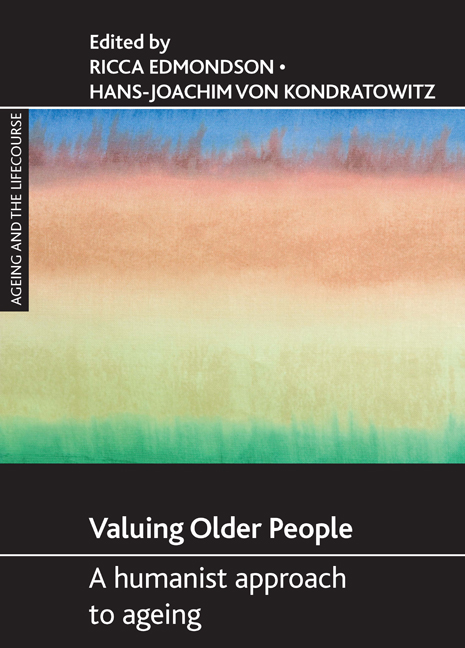Book contents
- Frontmatter
- Contents
- List of tables and figures
- Notes on contributors
- Acknowledgements
- Foreword
- Introduction
- Part One Religion, spirituality, cultural resources and creating meaning
- Part Two Norms, values and gerontology
- Part Three Ageing and wisdom? Conflicts and contested developments
- Afterwords
- Index
- Available titles in the Ageing and the Lifecourse series
seven - How to balance generations: solidarity dilemmas in a European perspective
Published online by Cambridge University Press: 05 July 2022
- Frontmatter
- Contents
- List of tables and figures
- Notes on contributors
- Acknowledgements
- Foreword
- Introduction
- Part One Religion, spirituality, cultural resources and creating meaning
- Part Two Norms, values and gerontology
- Part Three Ageing and wisdom? Conflicts and contested developments
- Afterwords
- Index
- Available titles in the Ageing and the Lifecourse series
Summary
Contrasting expectations
Intergenerational family relationships are situated in a field of contrasting expectations, with dilemmas and ambivalences that need to be negotiated. Duty and need, self-interest and altruism, affection and conflict are among the motivations that pull and push in different directions. People's beliefs and values, their feelings about what should happen as well as their anticipations of what can be expected to happen, clearly play a part in sustaining the shapes these relationships take. Research into these matters, though, has tended to concentrate on the younger generation. This chapter takes a complementary perspective, that of the older generation, and suggests that parental norms and motivations may be just as influential in intergenerational relationships and exchanges as those of their adult children. The older, parental perspective is often neglected and yet the mutual expectations of the generations define each other. A new generation, when it is added, might push the older generation not only into grandparenthood, but also into the category of old age, which would transform an otherwise delightful event into something of a mixed blessing. The assumed dependency of old age might in earlier times, and in some cultures even today, have been a respected and attractive status to which people gladly adapted. Not so often now, when independence and autonomy seem to be regarded as ideal across the life course, with the possible exception of the very latest part of the fourth age.
This chapter starts out from the observation that modern older people tend to want to remain independent as long as they possibly can and they seem in particular to be reluctant to depend on their children. Older parents are often afraid to burden their children, they are hesitant to ask them for help and they tend to be net providers of support to their children most of their lives, if resources allow them. The general hypothesis put forward here is that older parents are balancing between obligating and de-obligating their children. Comparative data suggests that filial independence and a set of priorities operating down the generations are comparatively stronger in northern Europe – parents seeing themselves as obliged to care for their children more than they expect care.
- Type
- Chapter
- Information
- Valuing Older PeopleA Humanist Approach to Ageing, pp. 123 - 138Publisher: Bristol University PressPrint publication year: 2009



